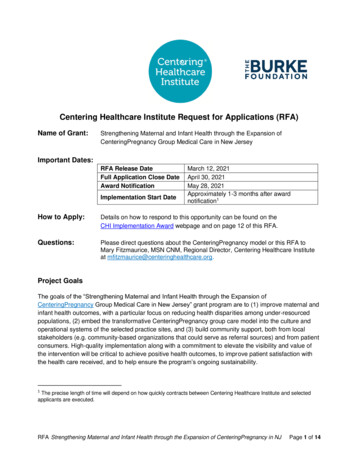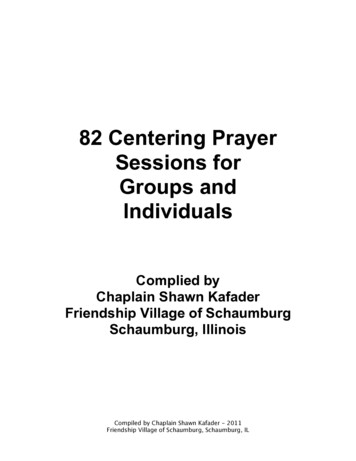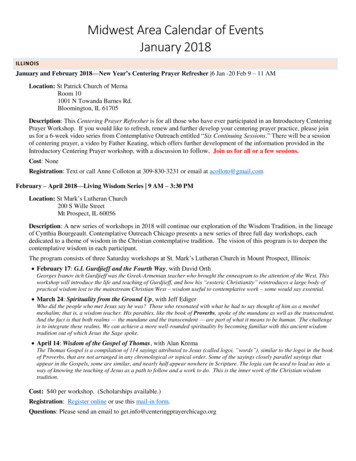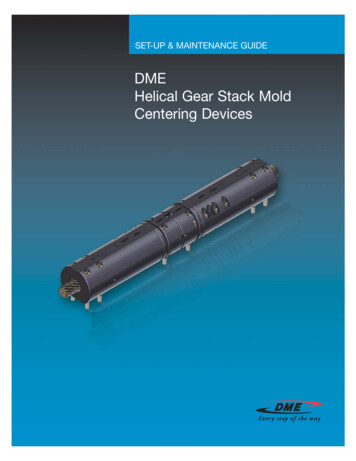
Transcription
Centering Healthcare Institute Request for Applications (RFA)Name of Grant:Strengthening Maternal and Infant Health through the Expansion ofCenteringPregnancy Group Medical Care in New JerseyImportant Dates:RFA Release DateFull Application Close DateAward NotificationImplementation Start DateMarch 12, 2021April 30, 2021May 28, 2021Approximately 1-3 months after awardnotification1How to Apply:Details on how to respond to this opportunity can be found on theCHI Implementation Award webpage and on page 12 of this RFA.Questions:Please direct questions about the CenteringPregnancy model or this RFA toMary Fitzmaurice, MSN CNM, Regional Director, Centering Healthcare Instituteat mfitzmaurice@centeringhealthcare.org.Project GoalsThe goals of the “Strengthening Maternal and Infant Health through the Expansion ofCenteringPregnancy Group Medical Care in New Jersey” grant program are to (1) improve maternal andinfant health outcomes, with a particular focus on reducing health disparities among under-resourcedpopulations, (2) embed the transformative CenteringPregnancy group care model into the culture andoperational systems of the selected practice sites, and (3) build community support, both from localstakeholders (e.g. community-based organizations that could serve as referral sources) and from patientconsumers. High-quality implementation along with a commitment to elevate the visibility and value ofthe intervention will be critical to achieve positive health outcomes, to improve patient satisfaction withthe health care received, and to help ensure the program’s ongoing sustainability.1The precise length of time will depend on how quickly contracts between Centering Healthcare Institute and selectedapplicants are executed.RFA Strengthening Maternal and Infant Health through the Expansion of CenteringPregnancy in NJPage 1 of 14
Project DescriptionCentering Healthcare Institute (CHI), with support from the Burke Foundation, is bringing the evidencebased and relationship-based Centering group healthcare model to more families and regions in NewJersey. Currently, 20 Centering sites operate in New Jersey, including five sites implemented as part ofthe state’s Department of Health’s Healthy Women, Healthy Families (HWHF) Initiative. CHI providestraining, technical assistance, and implementation support to all Centering practice sites in the state.This RFA seeks to identify practice sites committed to improving health outcomes by transforming carethrough CenteringPregnancy groups. Preference will be given to practice sites in geographic areas withpoor maternal health trends where positive outcomes would have the greatest impact. This includessites with sizeable Medicaid, charity care, and/or uninsured populations such as Federally QualifiedHealth Centers (FQHCs), community health centers, and hospital-based clinics.2 Funding for this RFAwill support a total of five (5) CenteringPregnancy sites for a period of two years (24 months), contingentupon successful completion of deliverables and progress achieved in the first year of the grant.To meet the goals of this initiative and set sites up for success, all applicants should commit toimplementation that follows the fundamental tenets of Centering (“model fidelity”): (1) collaborating withand receiving support from CHI staff; (2) engaging with a Centering community of practice; (3)conducting quality improvement activities, and (4) completing data collection, quarterly reportingfollowing group start, and any evaluation-related deliverables. Adherence to these evidence-basedelements of the Centering model will be crucial to improving health outcomes, reducing healthdisparities, improving patient satisfaction with received health care, and ultimately resulting in lowercosts to the practice and overall health care and social support systems.NOTE: This RFA is for applicants interested in offering the CenteringPregnancy model. A separateRFA for sites wishing to implement CenteringParenting was released in December 2020. Applicantsmay apply for funding to support implementation of one or both models. Many practices considerCenteringParenting to be a natural follow-on to the CenteringPregnancy model, promoting continuity ofcare for patients.Anticipated Number and Size of AwardsIn 2021, CHI intends to launch a total of five (5) CenteringParenting sites and five (5)CenteringPregnancy sites, for a total of 10 awards (or fewer if there are applicants that want toimplement both models).3Selected practice sites will benefit from in-kind support equivalent to approximately 34,000 to 35,000over the course of two years per practice site. This includes in-kind services provided by CHI toimplement CenteringPregnancy (e.g., training, implementation support, notebooks, a leader kit, and a2Please see New Jersey Maternity and Pediatric Health Trends: A County-level Review conducted by the New JerseyHealthcare Quality Institute as a potential resource.3Funding to support additional CenteringPregnancy sites may be available in future years. Promising applicants notfunded in the initial round may be considered for future grant cycles.RFA Strengthening Maternal and Infant Health through the Expansion of CenteringPregnancy in NJPage 2 of 14
starter set of CHI marketing materials) as well as costs covered through the grant (e.g., workshop feesand accreditation costs). In addition, practice sites will be eligible to receive direct funding as anoperational mini-grant of up to 10,000 from the Burke Foundation that practice sites can use towardsoperational expenses associated with implementation (e.g., medical equipment, space enhancements).ContextLow-income mothers of color are at the highest risk of poor birth outcomes in the United States. Despitebeing one of the wealthiest states in terms of per capita income, New Jersey continues to grapple withsome of the worst pregnancy, birth, and infant health outcomes in the country, especially among underresourced communities. New Jersey ranks among the worst U.S. states for maternal mortality – 47th outof the 50 states – with a rate of more than 46 deaths per every 100,000 live births, nearly 50 percentgreater than the national average.4 For women and babies of color, the statistics are even more dire. ABlack mother in New Jersey is seven times more likely to die than a white mother due to pregnancyrelated complications, with the most recent data showing a marked increase in this inequity.Outcomes for infants also reflect these disparities. Although the overall infant mortality rate in NewJersey is lower than the national rate (4.5 per 1,000 live births versus 5.8 per 1,000 live births in 2017),the disparity in infant mortality between non-Hispanic white and non-Hispanic Black infants is significant.In 2017, the infant mortality rate for white babies was 2.7 per 1,000 births, while for Black babies the ratewas 9.4 per 1,000 births.5 This means that in New Jersey a Black baby is three times more likely to diethan a white baby in their first year of life, a troubling disparity trend that has persisted for years.Disparities along racial lines also persist in other important health indicators. For example, the statewidepreterm birth rate in 2017 was 9.5 percent and the low birthweight rate was 8.0 percent. However,preterm and low birthweight rates among Black mothers (13.1 percent and 12.3 percent) notablyexceeded rates among white mothers (8.3 percent and 6.4 percent).6 Preterm births increase theprobability that infants will develop short-term complications (e.g., greater likelihood of developinganemia, infections, and respiratory and gastrointestinal conditions) as well as longer-term complications(e.g., vision and/or hearing problems, developmental delays, behavioral challenges, and chronic healthconditions).These troubling statistics fueled the Murphy Administration’s commitment to improve maternal and infanthealth for all New Jersey families, with a particular focus on reducing health disparities along racial,ethnic, and economic lines. In January 2019, First Lady Tammy Murphy launched Nurture NJ, astatewide campaign to reduce maternal and infant mortality and morbidity. The initiative includes thedevelopment of a comprehensive, actionable strategic plan that was unveiled in January 2021 andfocuses on improving outcomes and achieving equity in maternal and infant health. The Nurture NJ plan4America's Health Rankings analysis of CDC WONDER Online Database, Mortality files, United Health Foundation,AmericasHealthRankings.org, Accessed 2020.5New Jersey State Health Assessment Data (NJSHAD) – Birth Certificate Database, Office of Vital Statistics andRegistry, New Jersey Department of Health (NJDOH) and Linked Infant Death-Birth Database, Center for HealthStatistics, NJDOH.6NJSHAD – Birth Certificate Database, Office of Vital Statistics and Registry, NJDOH.RFA Strengthening Maternal and Infant Health through the Expansion of CenteringPregnancy in NJPage 3 of 14
aims to reduce maternal mortality by 50 percent and eliminate racial disparities in birth outcomes.Moreover, it highlights CenteringPregnancy as a high-quality prenatal care model and recommendsincreasing access to CenteringPregnancy across the state as a method to improve the quality of care forcommunities of color and to achieve greater health equity.To meet the challenge of making New Jersey “the safest place in the nation to give birth,”7 outlined in theNurture NJ plan, public and private investments must be laser-focused on programs with demonstratedeffectiveness. Along with such proven strategies as community doulas, maternal and infant homevisitation, and community health workers, CenteringPregnancy offers an evidence-based solution tosupport positive health behaviors, improve patient satisfaction with care, drive better health outcomes,and lower health care costs.Overview of the CenteringPregnancy ModelCentering is neither a supplement nor add-on to individual one-on-one well-child appointments – it isthe means of primary health care delivery. Centering brings patients out of the exam room and into acomfortable group setting where they learn from their providers and each other. The model enablesfamilies to have significantly more time with their primary care providers than they would in traditionalcare settings and consists of a series of facilitated group sessions. During each two-hour visit thatmakes up the Centering experience, there is ample time for health assessment, interactive learning,community building, and brief one-on-one exam time with the clinical provider. Visits meet nationallyrecognized standards8 and are facilitated by a care team made up of a credentialed health provider (i.e.,the individual who can bill for health care visits) and a co-facilitator (e.g., community health worker,lactation consultant, licensed clinical social worker, or medical assistant). As part of an ongoing group,patients form a supportive peer community where they build social capital and develop the skills andconfidence to take control of their own health and that of their children.CenteringPregnancy, CHI’s flagship model, is an established group prenatal care model. Facilitatorslead a cohort of eight to ten women of similar gestational age through a curriculum of 10 interactivegroup discussion sessions that cover important, timely medical and non-medical aspects of pregnancy,such as nutrition, stress management, fetal development, common physical discomforts, labor anddelivery, breastfeeding, and newborn care. Women engage in their care by taking their own weight andblood pressure and then recording the health data during the private one-on-one time with their clinicalprovider for a belly check. The format of the “circle-up” discussions are designed to address importantand timely health topics while leaving room to address questions and concerns raised by participatingpatients.78CenteringPregnancy follows the American College of Obstetricians and Gynecologists’ Guidelines for Prenatal Care,while CenteringParenting follows the American Academy of Pediatrics’ Bright Futures Guidelines schedule.RFA Strengthening Maternal and Infant Health through the Expansion of CenteringPregnancy in NJPage 4 of 14
In nearly 120 published studies and peer-reviewed articles, Centering demonstrates improvedoutcomes.9 According to the What Works for Health review of CenteringPregnancy at the University ofWisconsin Population Health Institute, participants are on average more likely to engage inbreastfeeding, have more appropriate gestational weight gain than non-participants, and report feelingbetter prepared for delivery and more satisfied with their prenatal care than non-participating women.10The most recent published study examined Medicaid claims data and found that Medicaid-enrolledwomen in CenteringPregnancy who attended at least five group sessions had higher rates of postpartumvisit attendance compared to women in individual prenatal care (71.5 percent vs. 67.5 percent); womenwith any CenteringPregnancy group attendance were more likely to receive contraception within threedays (19.8 percent vs. 16.9 percent) and to receive a long-acting reversable contraception within eightweeks postpartum (18.0 percent vs. 15.2 percent).11Moreover, research strongly suggests that CenteringPregnancy holds promise in reducing healthdisparities by supporting improved birth outcomes for Black women and their babies, particularlyreducing the risk of preterm births. The first published randomized controlled trial (RCT) ofCenteringPregnancy demonstrated an overall reduction of 33 percent in preterm births among Centeringpatients compared to those in standard individual care, reducing the instance of preterm births by 40births per 1,000 deliveries.12 This study also found that Black women had an even greater benefit with a41 percent reduction in preterm births (15.8 percent to 10.0 percent) than other racial/ethnic groups. Asecond RCT at the Greenville Health System in South Carolina found that CenteringPregnancy reducedvery early preterm delivery (before 32 weeks) to 1.3 percent compared to 3.1 percent for individual care,and preterm delivery to 7.9 percent compared to 12.1 percent for individual care. The racial disparity inpreterm birth for Black women relative to white and Hispanic women was virtually eliminated in thisstudy.13Services and Supports Provided by Centering Healthcare InstituteCHI is the national standards organization that supports the dissemination, implementation, andcontinuous quality assurance of Centering group models of care in the United States. Successfulapplicants will benefit from training, coaching, technical assistance, and tools from CHI’s expertconsultants – valued at 34,000 to 35,000 over 24 months – to support their healthcare delivery systemtransformation. CHI partners with local practice sites to offer: Implementation support for system change, including guidance on developing the CenteringImplementation Plan (CIP) that incorporates processes and tools to help sites identify and9A bibliography of published studies and peer-reviewed articles can be accessed g.pdf.10What Works for Health, University of Wisconsin Population Health Institute, School of Medicine and Public Health.Accessed 8/14/20: http://whatworksforhealth.wisc.edu/program.php?t1 22&t2 16&t3 110&id 433.11Heberlein E, Smith J, Willis C, Hall W, Covington-Kolb S, and Crockett A. (2020). The Effects of CenteringPregnancyGroup Prenatal Care on Postpartum Visit Attendance and Contraception Use. Contraception,102(1): 46-51.12Ickovics JR, Kershaw TS, Westdahl C, Magriples U, Massey Z, Reynolds H, and Rising SS. (2007). Group PrenatalCare and Perinatal Outcomes. Obstet Gynecol, 110(2): 330-339.13Picklesimer AH, Billings D, Hale N, Blackhurst D, and Covington-Kolb S. (2012). The effect of CenteringPregnancygroup prenatal care on preterm birth in a low-income population. Obstet Gynecol, 206(5): 415.RFA Strengthening Maternal and Infant Health through the Expansion of CenteringPregnancy in NJPage 5 of 14
address barriers. The CIP aims to position the site to successfully complete the accreditationprocess. Over the first 4-6 months, CHI collaborates with each site on the following areas:1.2.3.4.5.Creating your Steering CommitteeEngaging LeadershipBuilding a Shared VisionGoal Setting and EvaluationCreating your Centering Schedule6. Creating your Centering Space7. Patient Enrollment8. Provider Productivity9. Financing and Budgeting10. Billing and Reimbursement Comprehensive training and certification in group facilitation and group care. Basic andAdvanced Facilitation Workshops offer providers and staff the opportunity to explorefacilitative leadership and practice skill-building. These workshops model the Essential Elementsof Centering and are an opportunity for participants to understand the shift from didacticprovider-patient conversations to facilitative leadership through a group-based model. Access to and guidance on using CenteringWorks, an interactive and collaborative projectmanagement tool for tracking implementation progress against a CIP that provides sites withcontent and activities to support decision making during implementation. Access to and guidance on using CenteringCounts, an online group management and qualityassurance tool that measures model fidelity, sustainability, and health outcomes as well asoperational indicators and demographic information. Access to a library of ready-to-use resources and tools, including: curricula materials; supplies tosupport providers and patients; educational media; and a weekly live webinar series to addressinnovations and common challenges in Centering practice. Access to the CenteringConnects platform, an online peer learning network that linksCentering professionals across the U.S. to a national community of practice. Site accreditation for model fidelity and quality assurance.Project Activities and TimelineAnticipated Timeline for CenteringPregnancy Implementation (Years 1-2)Phase/MilestoneStart-upTimeframeMonths 1-3DescriptionAn assigned CHI team guides a site during the initial SteeringCommittee meeting, and throughout the start-up process, as thesite establishes a shared vision and goals, creates a group spaceand schedule, enrolls patients, and establishes financial systems.RFA Strengthening Maternal and Infant Health through the Expansion of CenteringPregnancy in NJPage 6 of 14
Kickoff EventMonth 3-5Site leadership, Centering staff and other clinical team members,and community partners (Steering Committee and others) meetwith the CHI implementation team for an immersive introduction toCentering to strengthen buy-in at every level. CHI providestargeted on-site support to finalize implementation and prepare forthe successful launch of groups.Basic FacilitationWorkshopMonth 5-6In a two-day training, facilitator teams explore Centering principlesand build essential facilitation and group management skills.Month 6Site begins group sessions. Typically, a site introduces one newgroup per month during this period. CHI consultants provideassistance through check-in calls and support ongoing groupmanagement and data tracking through CenteringCounts .Month 6Following the formation and launch of groups, a site recordspatient demographic, attendance, and outcomes data into theCenteringCounts online data system.AdvancedFacilitationWorkshopMonths 12-18Group facilitators who have completed CHI’s Basic FacilitationWorkshop are invited to attend the Advanced FacilitationWorkshop to further hone their facilitation skills with peers.Completing the advanced workshop prepares participants forachieving CHI’s Certified Centering Facilitator credential.14Site AccreditationMonths 12-18With multiple groups running, a site evaluates progress andreceives constructive feedback from its CHI team to strengthenimplementation and position the site for long-term success.Groups StartData Entry usingCenteringCounts BeginsData Collection and EvaluationSelected applicants will be required to use the CenteringCounts online data system for reporting onprocess and outcome metrics. A Business Associate Agreement (BAA) is required to access the system.Applicants will agree to share de-identified aggregated demographic data, process indicators, andoutcome indicators (monthly, quarterly, and/or annually) with both CHI and the Burke Foundation. 15 CHIdoes not share CenteringCountsTM data disaggregated by individual sites with third parties (such asfunders, advocacy groups, or research groups) unless a site provides explicit written approval. CHI mayshare aggregated data by demographic or outcome indicators for three or more sites combined.The following birth outcome indicators will be collected and recorded in CenteringCounts :14The CCF credential is a rigorous credentialing process that recognizes the strengths and professional commitment ofCentering facilitators. They are recognized for their expertise, experience, and personal investment with an evidencebased model of group care. Moreover, patients, practices, and payers are assured of the quality of care being provided.15If required by a selected applicant’s organization, the Burke Foundation will execute a BAA to access requested data.RFA Strengthening Maternal and Infant Health through the Expansion of CenteringPregnancy in NJPage 6 of 14
Live birthBirth Outcome IndicatorsBMI post pregnancyLabor inductionPreterm birth (auto-calculated by duedate & delivery date)Low birthweight (auto-calculated bybirthweight)(auto-calculated by height & weight)Postpartum visit attendanceDomestic violence screeningPostpartum depression screening(using the Edinburgh Postnatal Depression Scale)Method of deliveryFamily planning method identifiedNICU admissionNumber of non-Centering prenatal visitsCompletion of post-partum glucosetolerance testingNumber of days in the NICUBreastfeeding at discharge (any &exclusive)Breastfeeding postpartumNeonatal hypoglycemiaMedications needed for diabetes controlWeight post pregnancyIn addition to collecting and entering data through the CenteringCounts system, selected applicantsagree to participate in additional evaluation activities as agreed upon with CHI and the Burke Foundationduring the Start-Up phase.16 If any additional evaluation activities are identified beyond the scopeoutlined in this RFA, funding will be provided to support those activities.Application RequirementsInterested organizations must meet the following criteria to be considered a competitive applicant forCenteringPregnancy grants.Please note: Existing Centering practices that operate a Pregnancy or Parenting group care model arewelcome to apply to expand their capacity of Centering services. If you are applying to expand a modelthat you already operate, the expansion site must be located at a different practice location/geography.Organizational Capacity and Staffing: Has adequate patient volume for group care, defined as 150 newborn patients per year perlocation for CenteringPregnancy, to support starting one new group each month.16Such evaluation activities would likely include implementation research beginning during months 4-10 of group visitsand may leverage online surveys, focus groups, and/or key informant interviews to identify and synthesize lessonslearned and to inform the ongoing expansion of Centering in New Jersey.RFA Strengthening Maternal and Infant Health through the Expansion of CenteringPregnancy in NJPage 7 of 14
Has group space appropriate for Centering delivery, providing adequate space and privacy. Ifthis space is not exclusively dedicated to group care, Centering will have priority use of thespace at any and all times needed for program implementation. Will commit 4 hours to each Centering session and 8 hours per week for the CenteringCoordinator. The 4 hours is inclusive of the group time itself. Each Centering session runs 90-120minutes. Additional time before and after is needed for group preparation, co facilitatorprocess evaluation, charting, data entry into Centering Counts, and any other sitespecific tasks or group needs. Based on the implementation pathway and the project management responsibilities inCenteringWorks, the 8 hours weekly allocated for the Centering Coordinator is therecommended amount of time to ensure implementation success and long-termsustainability.Program Implementation with Fidelity: Agrees to implement Centering with fidelity to the model. As an evidence-based model,Centering has developed a list of 9 Essential Elements that are integral to programimplementation. Adhering to these 9 Elements will maximize the likelihood that a practice willachieve results comparable to previous randomized controlled trials and quasi-experimentalstudies.1.Health assessment happens in the group space.2.Patients engage in self-care activities.3.Groups are facilitated to be interactive.4.Each session has a plan, but emphasis may vary.5.There is time for socializing.6.Groups are conducted in a circle.7.Group members, including facilitators and support people, are consistent.8.Group size is optimal for interaction.9.There is ongoing evaluation.Commitment to Quality Improvement and Ongoing Learnings: Agrees to participate in a Community of Practice leadership activities to deepen knowledge andexpertise with and from other CenteringPregnancy sites. Agrees to communicate at least monthly with the New Jersey Centering Program Manager orother designated CHI team members for regular and as-needed consultation calls to discussprogress toward deliverable completion, site-specific challenges, and potential solutions. Agrees to achieve site accreditation within 18 months of signing a site agreement with CHI.RFA Strengthening Maternal and Infant Health through the Expansion of CenteringPregnancy in NJPage 8 of 14
Supporting Data and Evaluation: Has experience with data collection and evaluation, including routine continuous qualityimprovement activities (e.g., Plan-Do-Study-Act), and embraces a culture of learning. Agrees to enter data into CenteringCountsTM at the end of each Centering group session ormonthly as is relevant.Community Engagement and Sustainability: Has demonstrated experience successfully collaborating with community partners (external toyour practice) to jointly implement programs or initiatives (e.g., direct services,outreach/community engagement activities, training/professional development), and/orconducting cross referrals for resources and services. Willing and able to develop and maintain a Centering Steering Committee with activeengagement from a diverse group including frontline staff, pediatric staff, practice leadership,and cross-sector participation from areas beyond primary health care.17 Cultivating cross-sectorchampions for the Centering Steering Committee will help elevate the program in the communityand contribute to long-term sustainability. Priority will be given to applicants with greater than 25percent representation from external community stakeholders. Leadership within the practice demonstrates commitment to an on-going budget for Centering;scale-up to sustainable patient volume over time; dedicated time for the Centering Coordinatorand co-facilitators; and buy-in and support for Centering implementation throughout theorganization, from the C-suite to front-line team members. This commitment will bedemonstrated by a letter of support from the executive level to be included with the application.Additional Selection Criteria:In addition to the application requirements outlined in the previous section, the selection process willtake into account practice types and geographies. First, preference will be given to entities that provideclinical care to predominantly Medicaid, charity care, and/or uninsured patients (e.g., FQHCs,community health centers, hospital-based clinics, etc.). In addition, the following counties have beenidentified as priority communities for CenteringPregnancy expansion based on analysis of New Jerseypediatric outcome data.1817Examples of those external to your practice include representatives from WIC, community-based doula programs,parenting education, home visiting, behavioral health, early childhood education, breastfeeding coalitions, earlyintervention, health plans, and former Centering participants.18Data sources include New Jersey State Health Assessment Data (NJSHAD), New Jersey KidsCount, New JerseyDepartment of Education, Health Resources and Services Administration (U.S. Department of Health and HumanServices), and the Leapfrog Group.RFA Strengthening Maternal and Infant Health through the Expansion of CenteringPregnancy in NJPage 9 of 14
10 Priority NJ Counties for CenteringPregnancy1. Camden6. Burlington2. Essex7. Cumberland3. Hudson8. Middlesex4. Mercer9. Monmouth5. Passaic10. UnionThese counties report greater maternal health disparities and thus are a higher priority for investment.However, we recognize that community-level data may indicate other areas of need, and CHI welcomesapplications from providers that serve a high percentage of under-resourced pediatric patients anywherein the state. Any practices located outside of these 10 counties and interested in applying should contactMary Fitzmaurice, CNM MSN at CHI to discuss further: mfitzmaurice@centeringhealthcare.org.What the Grant Funding SupportsFunding provided by the Burke Foundation will cover the costs of in-kind support provided to practicesites by CHI valued at 34,000 to 35,000. Grant funding may also include up to 10,000 provideddirectly to individual practice sites to defray operational expenses associated with implementation duringYear 1. This funding is intended to offset start-up costs associated with the launch of a new Centeringprogram site, which can be an implementation barrier for some
Centering Healthcare Institute Request for Applications (RFA) Name of Grant: Strengthening Maternal and Infant Health through the Expansion of CenteringPregnancy Group Medical Care in New Jersey Important Dates: RFA Release Date March 12, 2021 Full Application Close Date April 30, 2021 Award Notification May 28, 2021 Implementation Start Date










